| Srl | Item |
| 1 |
ID:
164285
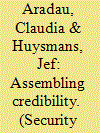

|
|
|
|
|
| Summary/Abstract |
Critical approaches in security studies have been increasingly turning to methods and standards internal to knowledge practice to validate their knowledge claims. This quest for scientific standards now also operates against the background of debates on ‘post-truth’, which raise pressing and perplexing questions for critical lines of thought. We propose a different approach by conceptualizing validity as practices of assembling credibility in which the transversal formation and circulation of credits and credentials combine with disputes over credence and credulity. This conceptualization of the validity of (critical) security knowledge shifts the focus from epistemic and methodological standards to transepistemic practices and relations. It allows us to mediate validity critically as a sociopolitical rather than strictly scientific accomplishment. Developing such an understanding of validity makes it possible for critical security studies and international relations to displace epistemic disputes about ‘post-truth’ with transversal practices of knowledge creation, circulation and accreditation.
|
|
|
|
|
|
|
|
|
|
|
|
|
|
|
|
| 2 |
ID:
147404
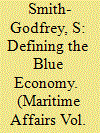

|
|
|
|
|
| Summary/Abstract |
Oceans are increasingly gaining in importance in terms of enabling international trade via linking sellers and buyers. The behaviour patterns of such linking enablers on the oceans are receiving more attention from a regulatory and economic perspective as the relationship between land and ocean evolves in its role and importance. The “Blue Economy” as a concept finds its origin against this background. A literature review is undertaken to analyse an appropriate definition for the Blue Economy. These definitions are analysed in terms of the minimum criteria which are necessary for a Blue Economy. The paper also attempts to structure various types of activities which are associated with ocean services. It is done with a view to identify what one may perceive as the focus areas for the growth of the Blue Economy.
|
|
|
|
|
|
|
|
|
|
|
|
|
|
|
|
| 3 |
ID:
169877
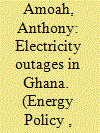

|
|
|
|
|
| Summary/Abstract |
African countries experience persistent and serious energy outages, but while multiple valuation studies provide estimates of the costs of electricity outages in high-income countries, evidence is scarce for lower- and middle-income countries. The few studies that assess the value of reliable energy supply rely on the contingent valuation method that is under wide scrutiny. This paper aims to provide new estimates of households' willingness to pay to reduce electricity outages for Ghana and contributes to the debate on the validity of contingent valuation results for energy reliability. Our results suggest that households are willing to pay GHS 67 ($17) per month for reliable electricity supply, equivalent to 7% of respondents’ income. The results of tests for hypothetical bias, WTP-WTA disparity and income effects suggest that the contingent valuation estimates from this study are robust and can support decision makers in prioritizing energy policies and investments.
|
|
|
|
|
|
|
|
|
|
|
|
|
|
|
|
| 4 |
ID:
183007
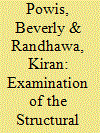

|
|
|
|
|
| Summary/Abstract |
This paper explores the construct validity and structural properties of the ERG22+ formulation tool, used in the assessment of risk and need in extremist offenders. The ERG22+ was developed from a clinical perspective, and was based on the small number of case studies and limited research evidence that were available at the time. It suggests three domains relevant to risk, namely Engagement, Intent, and Capability. These were originally offered as a guide to risk formulation within a functional analysis framework, but were not empirically derived. The items within the ERG22+ are scored on ordinal ratings which offers the possibility to develop subscales within the tool, but the conceptual overlap across the domains offered suggests that these would not be empirically reproduced. In this paper the structural properties of the ERG22+ were examined through factor analysis and multidimensional scaling (MDS) to inform the development of measurement scales. The ERG22+ shows promise as a risk and need formulation tool, which could be developed further in light of the findings from this study. Issues of content validity and areas for further development are discussed.
|
|
|
|
|
|
|
|
|
|
|
|
|
|
|
|
| 5 |
ID:
157107
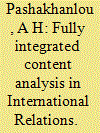

|
|
|
|
|
| Summary/Abstract |
Content analysis has once again come to the forefront of discussions regarding methods in International Relations (IR). The first wave of content analysis in IR lasted from the 1940s to the 1960s and was marked by a commitment to quantitative and manual analyses. The second wave of content analysis appeared at the start of the third millennium and continues to pervade the discipline. As with the first wave, it proceeds in a predominantly quantitative manner but emphasizes computer-assisted analysis rather than manual analysis. Critics and advocates of the method alike have, highlighted numerous shortcomings with these approaches. In order to address these limitations, the present investigation argues for a fully integrated content analysis that has the potential to ameliorate the identified weaknesses that have hitherto plagued the method. It accomplishes this task by combining all facets of the method: quantitative, qualitative, manual, and computer-assisted content analyses within a single research project.
|
|
|
|
|
|
|
|
|
|
|
|
|
|
|
|
| 6 |
ID:
124685
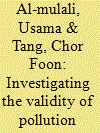

|
|
|
|
|
| Publication |
2013.
|
| Summary/Abstract |
This study investigated the validity of the pollution haven hypothesis in the Gulf Cooperation Council (GCC) countries using a multivariate framework. To achieve the goal of this study, the non-stationary panel techniques were used to examine the hypothesis from 1980 to 2009. Based on the Pedroni cointegration test results, it was found that the variables are cointegrated. Moreover, the Fully Modified OLS results showed that energy consumption and GDP growth increase CO2 emission while foreign direct investment inflows have a long run negative relationship with CO2 emission. Furthermore, based on the short run Granger causality test results, FDI has no short run causal relationship with CO2 emission and energy consumption while energy consumption and GDP growth have a positive causal relationship with CO2 emission. Thus, the results of this study indicate that energy consumption and GDP growth are the source of pollution in the GCC countries and not the foreign direct investment inflows. Thus, the study recommended that these countries should utilize policies to encourage inward foreign investment since it plays an important role in stimulating GDP growth.
|
|
|
|
|
|
|
|
|
|
|
|
|
|
|
|